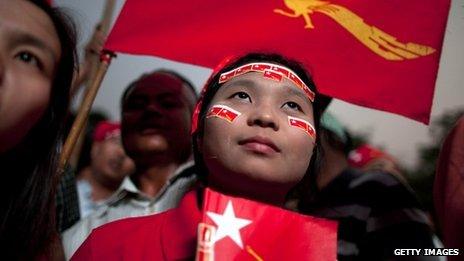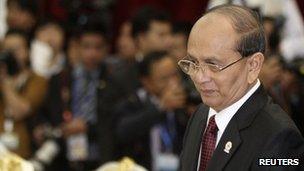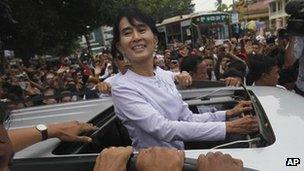What now for Burma after election landslide?
- Published

Aung San Suu Kyi has called on her supporters to be magnanimous in victory
There was never any doubt that Aung San Suu Kyi would win her seat in Sunday's by-elections in Burma, but few predicted the scale of her party's landslide victory.
The National League for Democracy (NLD) looks to have won all but one of the seats it contested, though the results have yet to be ratified.
But if the margin of success was a welcome surprise to Burma's pro-democracy movement, it will also have been an unsettling shock to the military establishment and its proxy party, the USDP, which received a drubbing at the polls.
The NLD even took seats in the nation's capital, Nay Pyi Taw, a city created by military generals and largely populated by government civil servants.
Amid the mood of celebration in the aftermath of the vote, there were notes of caution and a slight undercurrent of anxiety.
The caution comes from the realisation that these by-elections represent only a toe-hold in a parliament still dominated by the military's proxy party and the block of seats reserved for unelected members of the armed forces.
"We don't believe that Daw Aung San Suu Kyi alone can bring about the changes and development for our country," said one young man waiting outside the NLD's cramped offices in Rangoon.
"We can't say we are on the democratic path yet... but over the next few years, under the leadership of Aung San Suu Kyi, I think there will be more changes."
There are huge expectations resting on the shoulders of the 66-year-old national icon. Aung San Suu Kyi has won admiration at home and abroad for her dedication and sacrifice as a democracy activist and former political prisoner.
But now she must chart a course as an elected politician in a system still packed with men who served under the former autocratic regime against which she fought for so long.
The anxiety stems from the knowledge that there are still reactionary forces in Burma, those who fear reform in general and the current pace of change in particular.
The scenes of mass euphoria outside NLD headquarters in Rangoon may persuade them that it is time to apply the brakes to Burma's nascent process of liberalisation.
Which is why Aung San Suu Kyi was quick to try to calm her supporters, striking a conciliatory tone as she urged them to be magnanimous in victory. Gloating could be dangerous.
'Matching steps'
How then should the outside world calibrate its response?
Sunday's elections were seen in many capitals as a barometer of the government's commitment to political reform after a year in which it introduced a series of encouraging changes.

Western nations will want to acknowledge the reforms made under President Thein Sein
Burma's regional neighbours in the Association of South East Asian Nations (Asean) have already called for all sanctions to be lifted.
That seems unlikely. On the one hand Western nations will want to reward and bolster reformers within the government, especially President Thein Sein.
Despite imperfections in the election process, most people seem to agree that the campaign and poll were a huge improvement on the widely-criticised national election in 2010 which the NLD chose to boycott. Many argue that deserves recognition.
"We are prepared to match positive steps of reform in Burma with steps of our own," the US State Department spokeswoman, Victoria Nuland, told reporters in Washington.
But the administration is restricted in how much it can do. Most sanctions are under the purview of Congress, where sentiment tends to be more hawkish.
The European Union is currently reviewing its policy towards Burma. Sanctions, which include an arms embargo, and an assets freeze imposed on nearly 500 people, are due to expire on 30 April.

Aung San Suu Kyi must now adapt to her new role as the opposition in parliament
Earlier this year, the EU lifted travel bans on more than 80 senior officials, including the president. It looks certain to ease restrictions further.
But there may be an argument made for holding something in reserve to use as leverage to keep the Burmese leadership on the reformist path.
Catherine Ashton, High Representative of the European Union for Foreign Affairs, avoided making specific commitments when she congratulated the government and people of Burma on the conduct of the by-elections.
"We will continue to support the ongoing reforms in Myanmar [Burma]," she said, "and look forward to developing a new and co-operative relationship as these go forward."
Exile groups are urging Western governments to be circumspect.
"The US and EU should not reward the regime simply because the NLD has some seats in the parliament," Aung Din, executive director of the US Campaign for Burma, cautioned.
"They should wait until we see clearly how these newly-elected MPs are treated by the USDP and the military in parliament."
Therein perhaps lies the rub. The recent by-elections are being hailed as an important step in Burma's transition from decades of authoritarian military rule towards a more open, democratic and representative system.
But it is a transition fraught with difficulties.
Aung San Suu Kyi will feel that the risk she took in deciding to participate in the elections has been vindicated by the scale of her party's success.
But the real test will be to see how effective she is able to be as an agent for change within parliament.